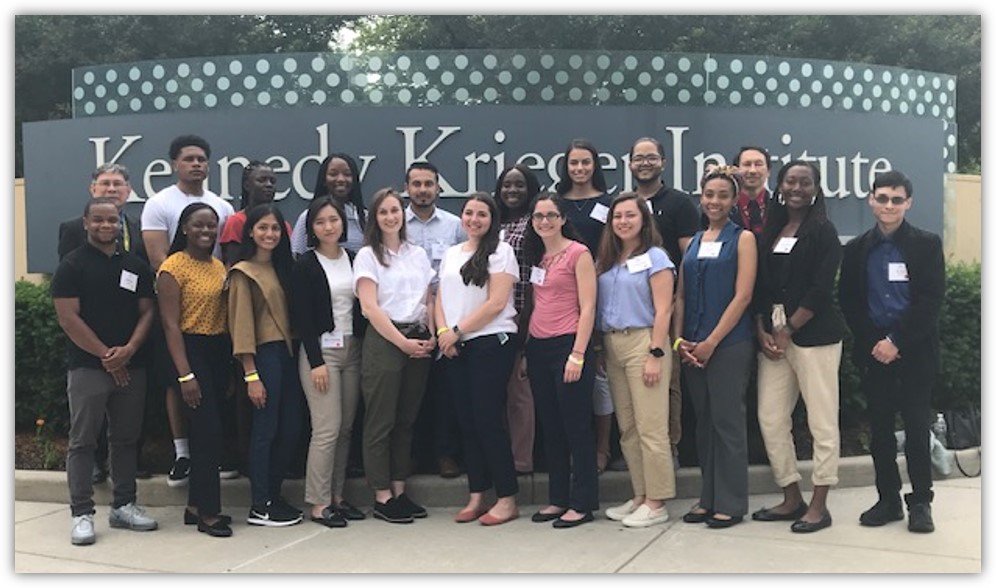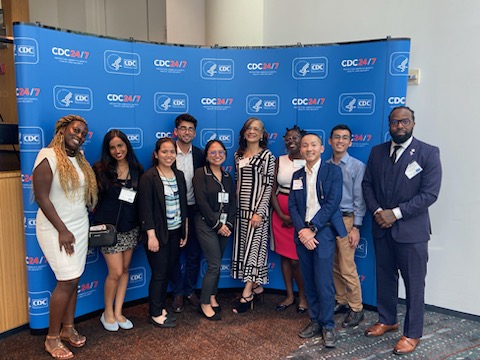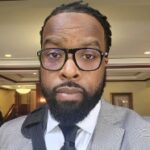
Darnell Davis cares deeply about using science to improve the greater good. His fascination with the microscopic intricacies of viruses strengthened during the COVID-19 pandemic and set him on a path to using epidemiology and molecular biology to improve public health policy and outcomes. Through his participation in the Ferguson RISE Fellowship and the APHL Public Health Laboratory Fellowship, Darnell has worked alongside leading institutions, faculty, and mentors to advance his knowledge of infectious diseases and public health.
Now an APHL Fellow and Ph.D. candidate in the Biology Department at Howard University, Darnell shares how his background, passion for microbiology, and fellowship experiences have advanced his career in public health and epidemiology. He also discusses the challenges he’s faced and shares his tips for creating a competitive fellowship application.
Can you tell us about your background? What inspired you to pursue Epidemiology and Public Health?
I pursued my interest in science at the University of North Texas at Dallas, where I obtained a Bachelor’s degree in Biology and a minor in Chemistry. My aim has always been to utilize scientific knowledge to assist others, a drive that has persisted throughout my academic journey. Presently, I’m pursuing a Ph.D. in the Biology Department at Howard University, specializing in molecular biology. My fascination with virology stems from the intricate workings at the microscopic level and my desire to contribute to the greater good. Viruses have a huge impact on life at all levels, making it crucial to gain a deeper understanding of them. Recent pandemics have further highlighted the importance of comprehending viruses both biologically and in terms of their societal implications.
I decided to explore epidemiology and public health after realizing the potential to use my knowledge of molecular biology to predict and control viral outbreaks. This field offered a practical way for me to significantly contribute to mitigating health crises. With my deep understanding of molecular biology, foundational knowledge of chemistry, and interest in public health, I have a unique position to connect these different fields. As a scientist, I am dedicated to utilizing my expertise to enhance our understanding of these areas and improve the quality of life for communities worldwide. I firmly believe that the knowledge we gather in the sciences should be utilized to help others.
What was the process like for you when applying to the Ferguson RISE Fellowship? What do you think made you a stand-out candidate?
The process of applying for the Ferguson RISE Fellowship was both challenging and fulfilling. There were many interviews and paperwork to complete, which required me to be patient and attentive. Despite this, the experience was deeply satisfying as it allowed me to showcase my dedication to the intersection of public health and molecular biology. I spent a significant amount of time detailing my research experiences, focusing on my work in virology and how my findings could significantly contribute to public health. My unique interdisciplinary approach helped me stand out as a candidate. I brought a fresh perspective to public health challenges, particularly in the context of viral diseases, thanks to my strong background in molecular biology. I showed my ability to bring fresh ideas to the field of epidemiology through my expert knowledge.
Additionally, my drive to make a real impact on communities by applying my research in practical ways made me a strong candidate for the Ferguson RISE Fellowship. Despite the demanding interview and paperwork requirements, I remained determined to succeed. The process allowed me to effectively communicate my passion and goals, which made it all worthwhile. Overall, this experience confirmed my dedication to working at the forefront of public health and molecular biology and reinforced the significance of my work in this field.
What do you hope to gain from the Ferguson RISE Fellowship? How has the experience been so far?
Through this fellowship, I aim to expand my knowledge of public health issues, strategies, and essential skills necessary to address them. The opportunity to establish a strong network of professionals and experts in the field is a significant aspect of this fellowship that excites me. Building these connections will allow me to share ideas, learn from their experiences, and explore collaborative opportunities to tackle critical health challenges. Networking is not only about meeting new people but also understanding new perspectives and approaches and how different roles and sectors contribute to the broader public health landscape.
Working on significant projects, such as developing new detection methods for coronavirus, has been the most fascinating aspect of this fellowship. This experience allowed me to practically apply my molecular biology expertise and see how it can contribute to public health initiatives. Throughout my fellowship, I had the opportunity to interact with staff and directors at the CDC Headquarters, which provided valuable insights into public health on a national scale and allowed me to align my efforts with broader objectives, ultimately increasing my impact.
Throughout my fellowship, I have been inspired and challenged by working on diverse projects and meeting individuals from various backgrounds. These experiences have broadened my perspective and introduced me to new public health topics. I look forward to the daily opportunities to learn and make a meaningful impact in this crucial field.

What advice would you provide for others interested in pursuing public health research?
Throughout my doctoral journey, I’ve encountered various experiences and challenges that have shaped my path. If I were to advise someone pursuing a similar career, I would stress the importance of being open-minded, adaptable, disciplined, and mindful of self-care. Public health and molecular biology are vast and ever-changing fields. New health concerns such as novel diseases, climate change, and social inequalities arise frequently, while molecular biology offers exciting discoveries like innovative research techniques and a deeper understanding of cellular processes. Being open to new information, methods, and perspectives is critical to keep up with these advancements and effectively apply them in a public health context. Discipline is vital on this journey, as the rigor of research and the necessity to continually update oneself require a strong commitment. Balancing this with self-care is equally important, as the intensity of our work may lead to neglect of personal health and well-being. Regular self-care routines can help maintain a healthy balance, prevent burnout, and improve professional performance.
Throughout my career, I have faced the unexpected challenge of effectively communicating with other professionals in my field. To bridge the gap between molecular biology and public health, I needed to deeply understand my specialization while also appreciating the work of others. As I progressed in my career, I found myself mentoring aspiring public health practitioners and molecular biologists, which required me to hone my leadership skills, be patient, and understand the broader scientific landscape to guide them effectively. Despite the challenges, integrating molecular biology and public health research is incredibly rewarding as it allows me to make a tangible impact on people’s lives and health.
My advice to anyone on this path is to remain adaptable, disciplined, and open-minded, prioritize self-care, and let your passion for enhancing public health through molecular biology guide you. While I wish someone had shared these insights with me earlier in my career, facing and overcoming these challenges has enriched my journey and expanded my professional capabilities.
You were also awarded a APHL Public Health Laboratory Fellowship! Can you share details about that?
I have a unique perspective on US healthcare and it’s crucial for me to share my work with the wider scientific community. At the Lewis-Ferguson Symposium in Atlanta, I met a representative who introduced me to the Association of Public Health Laboratories (APHL) fellowship opportunity. The APHL Public Health Laboratory Fellowships are offered through a partnership between APHL and the US Centers for Disease Control and Prevention (CDC) to train and prepare scientists for careers in public health laboratories and to support public health initiatives. After discussing my approach to public health, the representative directed me to the program’s application site.
The application process was smooth and straightforward as applicants are considered on a rolling basis. Because I am a doctoral level student, I had to provide three reference letters and indicate which laboratories I preferred to work at. After submitting my application, I received feedback within a few weeks. I was matched with a laboratory at my current institution and will be working under Dr. Ullah at Howard University. This opportunity is exciting, and I’m grateful for the lab’s support even as I’m just getting started. Our work has the potential to benefit many people in the public health sector.
What are you doing in your current role and what do you hope to gain from this experience? Where do you see yourself going next?
Currently, I am developing new methods for virus detection and identifying potential antiviral drug targets. Although enjoyable, I remind myself this is just the beginning of something unique. My goal is to offer transparency in healthcare through precise infection detection systems, ensuring people have access to proper health care and the options they deserve. I genuinely believe this research can do all of those things. Through this fellowship, I am looking forward to delving deeper into the intricacies of laboratory science, harnessing the power of molecular techniques, and driving forward our shared goal of a healthier future. And to be honest I’m open to wherever the help is needed the most. I am interested in working in infectious disease research and would like to explore opportunities in the field. Public Health is a huge arena and I definitely want to stay involved in whatever way I can.
Interested in applying to the Ferguson RISE Fellowship or the APHL Public Health Laboratory Fellowship? Bookmark them to your ProFellow account!
Darnell Davis started his academic journey at the University of North Texas at
© 2023 ProFellow, LLC, all rights reserved.